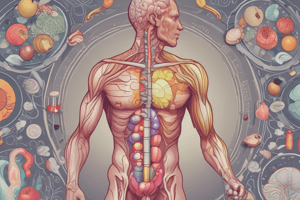Podcast
Questions and Answers
What is the primary focus of the science of nutrition?
What is the primary focus of the science of nutrition?
- The interaction of nutrients in the human body and their impact on health and disease (correct)
- The study of food processing and preparation
- The effects of exercise on human physiology
- The psychology of eating and food choices
Which of the following is NOT a macronutrient?
Which of the following is NOT a macronutrient?
- Proteins
- Vitamins (correct)
- Water
- Carbohydrates
What is the primary contributor to the high rates of overweight and obesity in North America?
What is the primary contributor to the high rates of overweight and obesity in North America?
- Decreased consumption of protein from animal sources
- Decreased physical activity and increased caloric intake (correct)
- Increased consumption of fruits and vegetables
- Increased physical activity and decreased caloric intake
What is the third most significant dietary issue in the North American diet?
What is the third most significant dietary issue in the North American diet?
What is the main difference between macronutrients and micronutrients?
What is the main difference between macronutrients and micronutrients?
What is the approximate percentage of Americans who are obese?
What is the approximate percentage of Americans who are obese?
What is the primary difference between hunger and appetite?
What is the primary difference between hunger and appetite?
What is the unit of measurement for the amount of heat energy required to raise the temperature of 1000 grams of water by 1°C?
What is the unit of measurement for the amount of heat energy required to raise the temperature of 1000 grams of water by 1°C?
How many kilocalories per gram do carbohydrates and proteins provide approximately?
How many kilocalories per gram do carbohydrates and proteins provide approximately?
What is the term for the consumption of more nutrients than the body needs, leading to excess energy intake?
What is the term for the consumption of more nutrients than the body needs, leading to excess energy intake?
What is the primary focus of dietary assessment in evaluating a person's nutritional status?
What is the primary focus of dietary assessment in evaluating a person's nutritional status?
What is the term for the nutrient intake that does not meet the body's needs, resulting in depleted nutrient stores?
What is the term for the nutrient intake that does not meet the body's needs, resulting in depleted nutrient stores?
Which of the following factors influences food choices?
Which of the following factors influences food choices?
What is the abbreviation for the unit of measurement that is equivalent to 1000 calories?
What is the abbreviation for the unit of measurement that is equivalent to 1000 calories?
Flashcards are hidden until you start studying
Study Notes
The Science of Nutrition
- The science of nutrition involves the study of food, nutrients, and substances in relation to health and disease, as well as the process of ingestion, digestion, absorption, transportation, utilization, and excretion of food substances.
Classes of Nutrients
- There are six classes of nutrients: carbohydrates, lipids (fats), proteins, vitamins, minerals, and water.
Macronutrients and Micronutrients
- Macronutrients are nutrients needed in large amounts: carbohydrates, lipids, proteins, and water.
- Micronutrients are nutrients needed in small amounts: vitamins and minerals.
Patterns in the Typical North American Diet
- American adults eat more and move less than they did 50 years ago, leading to a high prevalence of overweight and obesity.
- The top 3 dietary issues in the North American diet are:
- Consuming too many calories and not enough activity.
- Consuming too much protein and fat from animal sources and too little from plants.
- Consuming too many carbohydrates from simple sugars and too few from complex carbohydrates.
Influences on Food Choices
- Hunger vs. appetite: Hunger is physical, while appetite is psychological.
- Culture influences food choices through lifestyle, food processing, routines, and habits.
- Environment influences food choices through socioeconomic factors, food deserts, and access to grocery stores.
Units of Measurement
- A calorie is the amount of heat energy required to raise the temperature of 1 g of water by 1°C.
- A kilocalorie (kcal or Calorie) is the amount of heat energy needed to raise the temperature of 1000 grams of water by 1°C.
- The energy yields per gram of different nutrients are:
- Carbohydrate: 4 kcal/g
- Protein: 4 kcal/g
- Fat: 9 kcal/g
- Alcohol: 7 kcal/g
Malnutrition
- There are two forms of malnutrition: undernutrition and overnutrition.
- Undernutrition occurs when nutrient intake does not meet needs, leading to depleted nutrient stores, and is common in less developed countries.
- Examples of undernutrition include micronutrient deficiencies, protein deficiency, and calorie deficiency.
- Overnutrition occurs when consumption of nutrients exceeds the body's needs, leading to excess energy intake, and is common in more developed countries.
- Examples of overnutrition include obesity, vitamin toxicity, and unhealthy weight gain.
Assessing Nutritional Status
- The proper way to assess a person's nutritional status involves:
- Anthropometric assessment (measuring body aspects like height, weight, and circumferences)
- Biochemical assessment (measuring nutrient concentrations in blood, urine, and feces)
- Clinical assessment (physical evidence of diet-related disease)
- Dietary assessment (focusing on typical food choices)
- Environmental assessment (focusing on education, economic background, and other factors affecting nutrition)
Studying That Suits You
Use AI to generate personalized quizzes and flashcards to suit your learning preferences.




